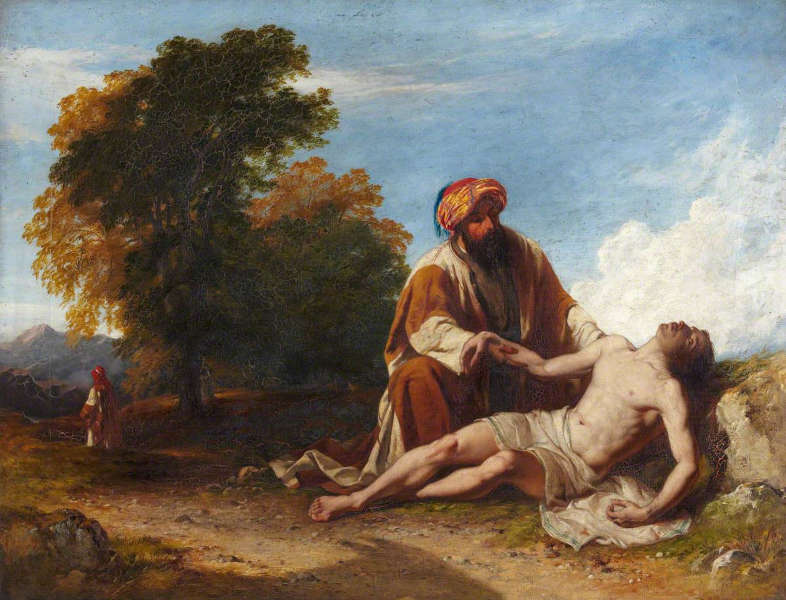
Pope Francis, preaching on this reading, said: “The priest and the Levite see but ignore; they look but they do not offer to help. Yet there is no true worship if it is not translated into service to neighbour. Let us never forget this: before the suffering of so many people exhausted by hunger, violence, and injustice, we cannot remain spectators.”
Over the years, I believe that I have played most of the characters in the Parable of the Good Samaritan. I suspect that most of you have as well. Most of us have at one time or another played the role of the lawyer, trying to get Jesus to explain the secrets of life to us.
Most of us have at one time or another played the role of the priest when we see a broken-down car on the side of the road, with its occupants standing around looking desperate for help, but we pass by, not because we are bad people, but because the rules of our society tell us that only fools would consider stopping on the side of the road to help strangers. After all it might be a trap, and surely, they have a cell phone so they can call the police who will surely come soon to help them.
And all of us have surely played the role of the Levite. Oh, you may want to be a Good Samaritan, but there are just too many street people, too many requests for money, too many people sleeping out in the cold, and too many vacant faces staring up at us.
It’s so difficult to know how or who to help. So, we strike up uneasy compromises to ease our consciences. We give away whatever coins we happen to have as if a few coins can really help. We go about our business failing to even bother asking how we might help for fear that from the vacant face we might hear a voice that demands more of us.
I know that each of us, whether we care to admit it or not, have played the role of the robbers. We live in the wealthiest part of the world, and we cannot deny that much of our wealth is snatched from the hands of the impoverished people of this world. Like it or not the role of robbers is one we often play.
The road to Jericho is always with us and the role we are least equipped to play is the role of the Good Samaritan. I suspect that the reason that this parable is so well known is that it speaks to our lives in such a way that we can all learn something from this story and over the years most of us have gleaned some wisdom from this parable. The good news is that of all the roles in the parable of the Good Samaritan, the role that I believe we may learn the most from is the role of the vulnerable person who lies wounded. When we are vulnerable, when we are at our lowest, we can’t afford to be choosy about which Good Samaritan we are willing to accept help from.
I have to say that I have learned more about God’s grace on those occasions when I have been vulnerable and wounded at the side of the road and in need of help. For when we are vulnerable it is easier somehow to let ourselves be touched by those who in other circumstances we might fear or call our enemies. When we are vulnerable, we are willing to be touched by those who under other circumstances we might judge to be the untouchables. When we are vulnerable, we are better able to recognize our neighbours.
It is my prayer that in her current vulnerability the church might finally realize Christ’s vision and begin a dialogue with the world God loves so much. This is an exciting time to be in the church. The Church is battered and bruised and in need of healing and Pope Francis is visiting Canada in less than two weeks so that he can apologize in person for abuses suffered by Indigenous people at the hands of the Catholic Church. We don’t know how the message will be received or how it will bring healing and reconciliation. But we are a resurrection people and we know that out of our vulnerability and the example of the Holy Father new life will spring forth. So we need not fear, because through you and me, and all of those who are willing to recognize our neighbours, whoever they may be, healing will happen. We have to be open to learn from past tragedies in order for healing to occur.
Perhaps this is the most moving parable in Scripture. Why? Because it cuts to the roots of the world’s wayward prejudices. That is what the Popes mission is about. Remember, in Jesus’ time, the Jews and the Samaritans despised each other. No matter what religion or non-religion one follows, one can readily find the truth in this drama. That is why it is so moving.
Does this story touch me? Could I spend some time reflecting on this parable as if it were addressed personally to me? I may love the Lord with all my heart and all my soul, but whom in my life is my neighbour? And to whom am I a good neighbour?
Lord, as we make our way through this and every day, give us eyes to see our marginalised and suffering brothers and sisters — past and present. Give us hearts that will love you present in the faces of others. Give us hands that help as well as lips that pray.
– Deacon Terry Murphy

